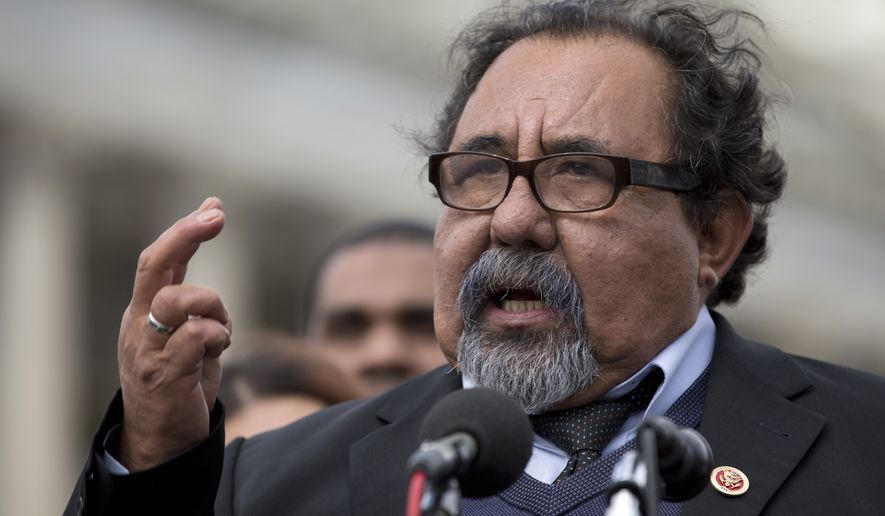Members of Congress are back home this week and facing a barrage of questions from constituents worried about the threat from the terrorist army that calls itself the Islamic State and about President Obama’s plan to fight it in part by arming a ragtag band of Syrian rebels.
The answers are especially complicated for the 85 House Democrats who voted against Mr. Obama’s plan, as terrorism emerges as a top issue in the midterm campaigns.
“It is a weak plan relative to the training of ’vetted’ Syrian rebels. I worry about that,” said Rep. Anna G. Eshoo, a liberal-leaning California Democrat.
Ms. Eshoo is a close ally of House Minority Leader Nancy Pelosi, California Democrat, who prodded her members to back Mr. Obama’s plan to arm the rebels.
Ms. Eshoo said she would tell voters in her Palo Alto district that she had several “major hesitancies” about Mr. Obama’s entire strategy, which includes expanded U.S. airstrikes, advising Iraqi forces and assembling an international coalition of fighters.
“The president presented a plan, a good plan, but it’s complicated because it is a highly complex situation,” she said. “Some major parts of the plan are still missing. The blank has not been filled in.”
Congress approved the president’s plan last week before taking a two-month break to campaign before the November elections.
The Senate approved it by a 78-22 vote, and the House passed it by a vote of 273-156. A majority of both parties in each chamber supported the plan.
The unease in the electorate about the Islamic State, also known by the acronyms ISIL and ISIS, compounded the Democratic Party’s weakness on national security issues and its struggle with Mr. Obama’s low approval rating.
An NBC News/Wall Street Journal poll this month found that nearly half of Americans — 47 percent — said the country was less safe now than at any other time since the Sept. 11, 2001, attacks by al Qaeda terrorists.
Just 32 percent of voters approved of Mr. Obama’s performance on foreign policy, according to the poll.
Rep. Greg Walden of Oregon, chairman of the Republican Congressional Campaign Committee, said the terrorism issue was “popping.”
“We’re seeing a big uptick on national security issues,” he told reporters last week at an interview session hosted by The Christian Science Monitor. “We’re seeing it all over the country.”
The NRCC has aired TV ads hitting a half-dozen Democratic candidates for being weak on national security.
Rep. Steve Israel of New York, chairman of the Democratic Congressional Campaign Committee, agreed that the terrorism was on voters’ minds but accused Republicans of playing politics with the issue.
“I think most Americans, particularly in competitive districts, want a robust response to terrorists around the world,” said Mr. Israel, New York Democrat. “You know, there was a time when politics ended at the water’s edge. And this should not be political; this should be about protecting the American people.”
Rep. Raul M. Grijalva, Arizona Democrat, said he was bracing for town hall meetings and other political events that would be dominated by questions about the Islamic State, which has seized a swath of territory in Iraq and Syria that is equal to the size of Maryland.
The terrorist group grabbed international attention by releasing videos of beheadings of two kidnapped U.S. journalists and a British aid worker.
But Mr. Grijalva compared Mr. Obama’s plan to President George W. Bush’s run-up to the Iraq War.
“I’m going to say that I voted ’no’ because I was here and I’ve seen this movie before,” Mr. Grijalva said.
Echoing scores of fellow Democrats, Mr. Grijalva called for a full debate and vote on an Authorization for Use of Military Force that encompasses all of Mr. Obama’s war plan. He called it a “very important step, the Constitutional step.”
“I didn’t feel Congress should be left out of the loop,” he said.
Rep. Jerrold Nadler, New York Democrat, said he would tell his constituents that Mr. Obama had overstepped his constitutional authority.
“I’ll tell them, because I’m sure they’ll ask, that the main reason I voted against [Mr. Obama’s plan] is that I think it is beyond the constitutional power of the president to order offensive airstrikes without congressional authorization,” he said. “We ought to be voting on an Authorization for Use of Military Force. We still ought to. I’m am very strong on that.”
He said it was the same reason he opposed Mr. Obama’s airstrikes in Libya, which helped rebels topple dictator Moammar Gadhafi.
“I was afraid that the vote to arm the Syrian rebels, though not an AUMF, might be taken by the public, by the press and maybe even by the courts as a functional equivalent,” he said. “And there are a lot of questions to ask and answer before we do that.
“I don’t blame this president,” he said. “Every president since World War II has extended presidential authority under war powers, and we ought to stop that.”
• S.A. Miller can be reached at smiller@washingtontimes.com.




Please read our comment policy before commenting.